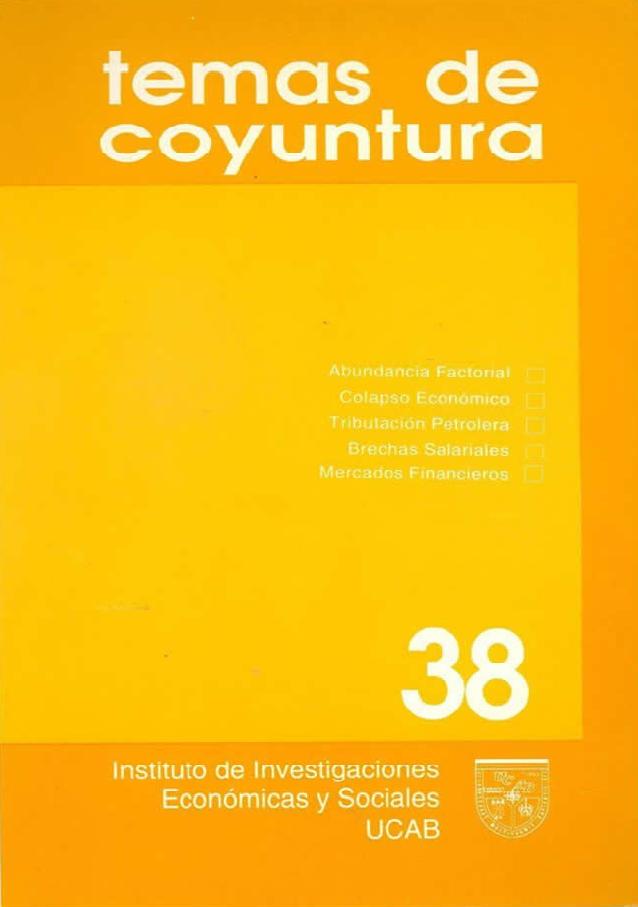EL COLAPSO ECONÓMICO VENEZOLANO: CAUSAS E IMPLICACIONES
Resumen
Este trabajo propone una nueva explicación para entender el pobre desempeño económico venezolano durante las últimas tres décadas. Sugerimos que la tendencia natural de economías abundantes en recursos naturales es a mostrar tasas negativas de crecimiento en el largo plazo. Demostramos este efecto a través de un modelo teórico así como un modelo computable calibrado a la economía venezolana.Descargas
Citas
ANTIVERO (1992) Series Estadísticas de Venezuela en las últimas cincuenta años
Vols. I-V Caracas: Banco Central de Venezuela.
ARROW AND HAHN (1971) General Competiríve Analysis. Edinburgh: Holden Day.
BANCO CENTRAL DE VENEZUELA (Various Years) Anuario de Cuentas
Nacionales. Caracas: Banco Central de Venezuela.
BULMER THOMAS, V. (1994) The economic history of latín America since
independencia. Cambridge: Cambridge University Press.
CHENERY, Hollis B. y Moshe Syrquin (1986) "Typical Patterns of Transformation“.
ln Chenery, Robinson and Syrquin, edsi Indusrrialízatian and growth: A
comparative study. New York; Oxford; Toronto and Melboume: Oxford
University Press
CLEMENTE. Lino y Alejandro Puente (1987) “La Matriz de insumo Producto de
Venezuela en 1984", Mímea, Instituto de Urbanismo, UCV.
COLLINS, Susan M. And BARRY BOSWORTH (1996) “Economic Growth in East
Asia: Accumulation vs. Assimilation.” Brookings Papers in Economic
Activity 2: 1996.
DEBREU, G. (i959) Theory of Value. New York: Wiley.
DEVARAJ AN, S.; GHANEM, H. And K. THIERFELDER (1996) “Economic Reform
and Labor Unions: A General-Equilibrium Analysis Applied to Bangladesh
and Indonesia". Mimeo, The World Bank.
DERVIS, Kemal, de Melo, Jaime and Sherman Robinson (1982) General equilibrium
models for development policy New York : Cambridge University Press,
ENRIGHT. Michael J.; FRANCÉS, Antonio y SCOTT SAAVEDRA (1994) Venezuela,
el reta de la competitividad. Caracas: Ediciones IESA.
FELDSTEIN. Martin and Charles HORIOKA (l980)“Domestic Saving and Interrmtional
Capital Flows". Economic Journal 90, 314-29.
FINDLAY, Ronald (1995) Facrorproportions, trade, and growth Cambridge, Mass;
MIT Press.
GELB, Alan l-l. (1986) “Adjustment to Windfall Gains: a comparative analysis of oil-
exportingcountries,” in Neary, J . Peter, and Sweder vanWijnbergen Natural
Resources and rhe Macraeconomy.
GELB, Alan H, and Associates (1988) Oil windfallr: blessing or curse? New York
Oxford University Press.
GINSBURGH, Victor and Jean L. Waelbroeck (1981) Activity analysis and general
equilíbrium modeling Amsterdam: North-Holland.
HENTSCHEL, Jesko (1992) Imports and growth in highly indebred countries: an
empírica! study New York : Springer-Verlag.
KARL, Terry Lynn "The Paradox of Plenty: Oil Bocms, Venezuela, and other Petro-
Stales". Mímea, Stanford University.
LANE, Phillip and TORNELL, Aaron (1996) “Power, Growth. and the Voracity
Effect," Jamal of Economic Growth l, 213-241
LEWIS, Arthur (1954) “Economic Development with Unlimited Supplies of Labour."
In LaL-Deepak, ed. Development economías. UK: Elgar.
MATSUYAMA, K. (1992) “Agricultural Productivity. Cumparative Advantage, and
Economic Growth." Journal of Economic Theory 581317-334.
MINISTERIO DE ENERGÍA Y MINAS (1976) Petróleo y otros durar estadísticos.
Caracas: División de Imprenta y Reproducción del MEM.
NAÍM, Moisés (1989) Las Empresa: venezolanas: su gerencia. Caracas : Ediciones
IESA.
NEGISHLT. (1972) Generd Equilibrium Theoryand International. Trade Amsterdam:
Nardi-Holland.
OCEI (Various Years), Anuario del Comercio Exteríorde Venezuela. Caracas: Oficina
Central de Estadística e Infomática.
OSTRY, Jonathan and Carmen REINI-IART ( 1992) “Private Saving and Terms of Trade
Shocks: Evidence from Developing Countries". IMF Staff Papers 39.495-
PAREDES, Carlos (1993) “Productivity Growth in Venezuela: The Need to Break with
the Past.” Mimeo, IESA,
PEROTTI, Roberto (1996) “Redistribuúon and Non Consumption Srnoothing in an
Open Economy,” Review ofEcanomic Studier 63.
PDVSA ([993) PDVSA Dam Dírkerte. Caracas: Petróleos de Venezuela, S. A.
RODRÍGUEZ, Gumersindo (1986) Era Posible Ia Gran Venezuela? Caracas: Editorial





.png)



